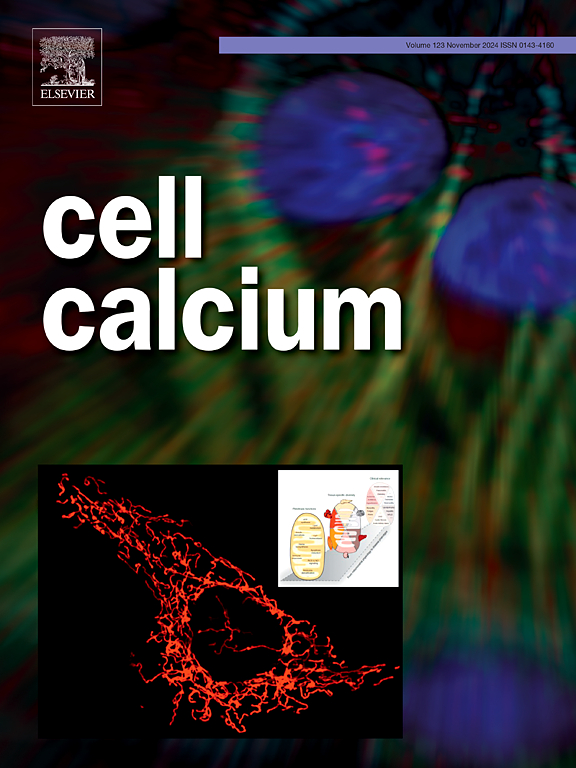Ca²⁺ signaling in myenteric interstitial cells of Cajal (ICC-MY) and their role as conditional pacemakers in the colon
IF 4
2区 生物学
Q2 CELL BIOLOGY
引用次数: 0
Abstract
Interstitial cells of Cajal in the plane of the myenteric plexus (ICC-MY) serve as electrical pacemakers in the stomach and small intestine. A similar population of cells is found in the colon, but these cells do not appear to generate regular slow wave potentials, as characteristic in more proximal gut regions. Ca2+ handling mechanisms in ICC-MY of the mouse proximal colon were studied using confocal imaging of muscles from animals expressing GCaMP6f exclusively in ICC. ICC-MY displayed stochastic, localized Ca2+ transients that seldom propagated between cells. Colonic ICC express ANO1 channels, so Ca2+ transients likely couple to activation of spontaneous transient inward currents (STICs) in these cells. The Ca2+ transients were due to Ca2+ release and blocked by cyclopiazonic acid (CPA), thapsigargin and caffeine, but unaffected by tetracaine. Antagonists of L- and T-type Ca2+ channels and reduction in extracellular Ca2+ had minimal effects on Ca2+ transients. We reasoned that STICs may not activate regenerative Ca2+ waves in ICC-MY because voltage-dependent Ca2+ conductances are largely inactivated at the relatively depolarized potentials of colonic muscles. We tested the effects of hyperpolarization with pinacidil, a KATP agonist. Ca2+ waves were initiated in some ICC-MY networks when muscles were hyperpolarized, and these events were blocked by a T-type Ca2+ channel antagonist, NNC 55–0396. Ca2+ waves activated by excitatory nerve stimulation were significantly enhanced by hyperpolarization. Our data suggest that colonic ICC-MY are conditional pacemaker cells that depend upon preparative hyperpolarization, produced physiologically by inputs from enteric inhibitory neurons and necessary for regenerative pacemaker activity.

ca2 +在Cajal肌间质细胞(ICC-MY)中的信号传导及其在结肠中作为条件起搏器的作用。
肌丛平面Cajal间质细胞(ICC-MY)在胃和小肠中起电起搏器的作用。在结肠中也发现了类似的细胞群,但这些细胞似乎不能产生规律的慢波电位,这是更近端肠道区域的特征。通过在ICC中表达GCaMP6f的动物的肌肉共聚焦成像,研究了小鼠近端结肠ICC- my中的Ca2+处理机制。ICC-MY表现出随机的、局部的Ca2+瞬态,很少在细胞间繁殖。结肠ICC表达ANO1通道,因此Ca2+瞬态可能与这些细胞中的自发瞬态内向电流(tics)激活偶联。Ca2+瞬态是由于Ca2+释放,并被环吡唑酸(CPA), thapsigargin和咖啡因阻断,但不受丁卡因影响。L型和t型Ca2+通道的拮抗剂和细胞外Ca2+的减少对Ca2+瞬态的影响最小。我们推断,tic可能不会激活ICC-MY中的再生Ca2+波,因为电压依赖性Ca2+电导在结肠肌肉的相对去极化电位下大部分失活。我们用pinacidil(一种KATP激动剂)测试了超极化的效果。当肌肉处于超极化状态时,Ca2+波在一些cc - my网络中启动,这些事件被t型Ca2+通道拮抗剂NNC 55-0396阻断。超极化显著增强兴奋性神经刺激激活的Ca2+波。我们的数据表明,结肠ICC-MY是条件性起搏器细胞,依赖于准备性超极化,由肠抑制神经元输入产生,是再生起搏器活动所必需的。
本文章由计算机程序翻译,如有差异,请以英文原文为准。
求助全文
约1分钟内获得全文
求助全文
来源期刊

Cell calcium
生物-细胞生物学
CiteScore
8.70
自引率
5.00%
发文量
115
审稿时长
35 days
期刊介绍:
Cell Calcium covers the field of calcium metabolism and signalling in living systems, from aspects including inorganic chemistry, physiology, molecular biology and pathology. Topic themes include:
Roles of calcium in regulating cellular events such as apoptosis, necrosis and organelle remodelling
Influence of calcium regulation in affecting health and disease outcomes
 求助内容:
求助内容: 应助结果提醒方式:
应助结果提醒方式:


